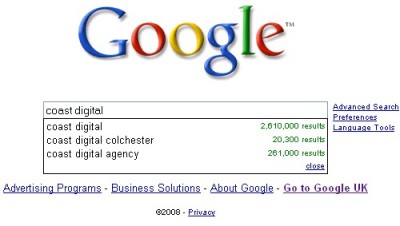Google have rolled out a ‘new’ feature which will be familiar to anyone who has taken a peek at Google Labs over the last couple of years.
Google Suggest enhances the standard Google search bar with further search queries generated by the data centre.
From Google Labs:
“Google Suggest is a feature that analyses what you’re typing into the search box and offers relevant suggested search terms in real time. You can choose one of the suggested queries by moving up or down the list with the arrow keys or mouse.”

It is possible, according to Google, to disable this new feature, via the preferences page. They are also keen to point out that Google Suggest is not the same as a user’s personal search history, something which will, no doubt, confuse some less web-savvy users in the weeks to come.
Our initial reaction to the news, having had a look at the labs beta version some months ago, is this could have a remarkable effect on keyword traffic volumes and link referrers for many sites, and could make significant changes to the SEO playing field.
Potentially a previously low frequency, long tail search term could be boosted considerably, by appearing in the new Google Suggest drop-down. This may also have the effect of reducing the emphasis on appearing high in the SERPS for shorter tail keywords, if relevant longer tail keywords are in the Suggest list.
It is not unlikely that as a result we will see a reduction in spelling mistakes in search terms. And some PPC campaigns may need to be adapted to target all “suggest” items in a list to ensure maximum ad coverage.
Potentially, this update could yield a number of different knock-on effects, some more significant than others. For now, I think the only way to find out for sure is to keep watching Analytics logs and keeping a close eye on the ball.
It may well turn out that the new ‘holy grail’ is for your long tail key phrases to appear in the suggest box for a much shorter tail search term. This might be the next “position 1 guaranteed” service to be touted by shady SEO companies and spam mail shots across the globe. Who knows what ‘tricks’ are going to surface to ensure your terms inclusion?
